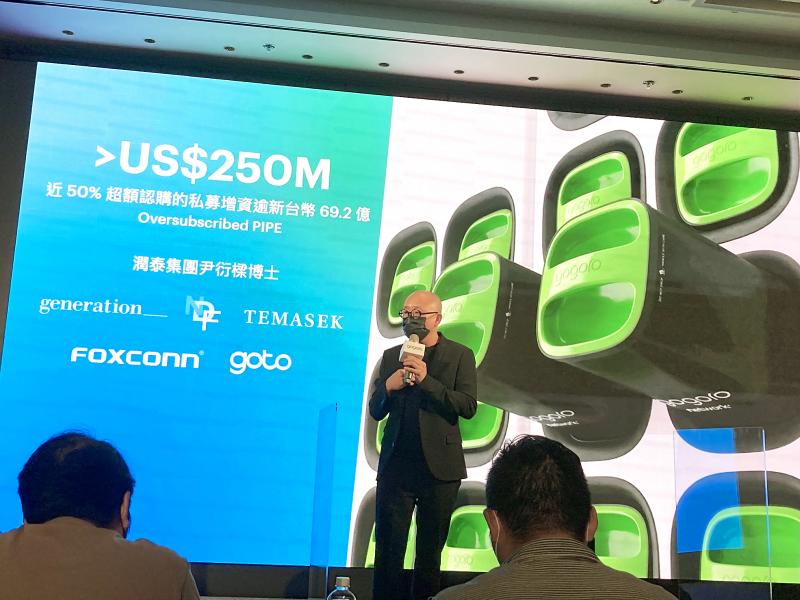Gogoro Inc (睿能創意), an electric scooter maker and a battery swapping system provider, yesterday said it targets to launch an initial public offering (IPO) on Nasdaq via a merger with the special-purpose acquisition company (SPAC) Poema Global Holdings Corp in the first quarter next year.
The combination would set Gogoro’s enterprise value at US$2.35 billion, more than doubling the US$1 billion value that defines a “unicorn.”
The planned merger is also expected to provide proceeds of about US$550 million to Gogoro’s balance sheet, including an oversubscribed private investment in public equity (PIPE) of more than US$250 million and a trust of US$345 million held by Poema Global, Gogoro said.

Photo: Lisa Wang, Taipei Times
“Gogoro is a global company based in Taiwan ... From day one, we were looking to establish a global platform,” Gogoro founder and CEO Horace Luke (陸學森) told a media briefing in Taipei when asked why the company is seeking to list on a US exchange rather than a local market.
“NASDAQ was always the target,” Luke said. “Apple [Inc], Intel [Corp], Tesla [Inc] and Amazon [.com Inc] all listed on NASDAQ. ”
The PIPE is backed by strategic investors, automobile partners and existing financial investors, the company said.
Gogoro’s strategic investors include two new investors: Taiwan’s Hon Hai Technology Group (鴻海科技集團) and the GoTo Group, the largest technology group in Indonesia, it said.
The company’s other investors include Taiwan’s National Development Fund, former US vice president and environmentalist Al Gore’s Generation Investment Management LLP, Temasek Holdings Pte of Singapore, and founding investor, Samuel Yin (尹衍樑) of Ruentex Group (潤泰集團).
Hon Hai Precision Industry Co (鴻海精密) said that it invested US$20 million in Gogoro, giving Hon Hai a 0.76 percent stake, a company filing with the Taiwan Stock Exchange showed.
The investment would help the company further its expansion into the electric vehicle and new energy fields, Gogoro said.
The proceeds of the IPO would allow Gogoro to expand its footprint overseas, duplicating its success in the home market, it added.
Gogoro aims to introduce its electric battery swapping services in China’s Hangzhou and Wuxi cities next quarter, leveraging its partners’ market strength, it said, adding that it plans to add five or six cities to its Chinese footprint next year.
Gogoro’s Chinese partners, Yadea Technology Group Co (雅迪科技集團) and Jiangmen Dachangjiang Group Co (DCJ, 大江集團), operate a total of more than 50,000 outlets in China, which would be ideal locations for Gogoro’s battery swapping stations, Luke said.
Gogoro plans to expand its reach into New Delhi in the second half of next year by teaming up with Hero MotoCorp Ltd, India’s biggest motorcycle maker, Luke said.
Hero operates about 7,000 retail stores, which are also potential locations for Gogoro’s electric battery swapping service, he said.
Gogoro said that its battery swapping ecosystem is an established leading solution for electric refueling of lightweight urban vehicles.
In less than five years, the company has accumulated more than US$1 billion in revenue and 400,000 battery swap subscribers.
Gogoro said that it has yet to make a profit, but that it has posted healthy earnings before an interest, taxes, depreciation and amortization margin of 55 percent, which might climb to 60 percent.

With this year’s Semicon Taiwan trade show set to kick off on Wednesday, market attention has turned to the mass production of advanced packaging technologies and capacity expansion in Taiwan and the US. With traditional scaling reaching physical limits, heterogeneous integration and packaging technologies have emerged as key solutions. Surging demand for artificial intelligence (AI), high-performance computing (HPC) and high-bandwidth memory (HBM) chips has put technologies such as chip-on-wafer-on-substrate (CoWoS), integrated fan-out (InFO), system on integrated chips (SoIC), 3D IC and fan-out panel-level packaging (FOPLP) at the center of semiconductor innovation, making them a major focus at this year’s trade show, according

DEBUT: The trade show is to feature 17 national pavilions, a new high for the event, including from Canada, Costa Rica, Lithuania, Sweden and Vietnam for the first time The Semicon Taiwan trade show, which opens on Wednesday, is expected to see a new high in the number of exhibitors and visitors from around the world, said its organizer, SEMI, which has described the annual event as the “Olympics of the semiconductor industry.” SEMI, which represents companies in the electronics manufacturing and design supply chain, and touts the annual exhibition as the most influential semiconductor trade show in the world, said more than 1,200 enterprises from 56 countries are to showcase their innovations across more than 4,100 booths, and that the event could attract 100,000 visitors. This year’s event features 17

EXPORT GROWTH: The AI boom has shortened chip cycles to just one year, putting pressure on chipmakers to accelerate development and expand packaging capacity Developing a localized supply chain for advanced packaging equipment is critical for keeping pace with customers’ increasingly shrinking time-to-market cycles for new artificial intelligence (AI) chips, Taiwan Semiconductor Manufacturing Co (TSMC, 台積電) said yesterday. Spurred on by the AI revolution, customers are accelerating product upgrades to nearly every year, compared with the two to three-year development cadence in the past, TSMC vice president of advanced packaging technology and service Jun He (何軍) said at a 3D IC Global Summit organized by SEMI in Taipei. These shortened cycles put heavy pressure on chipmakers, as the entire process — from chip design to mass

Germany is to establish its first-ever national pavilion at Semicon Taiwan, which starts tomorrow in Taipei, as the country looks to raise its profile and deepen semiconductor ties with Taiwan as global chip demand accelerates. Martin Mayer, a semiconductor investment expert at Germany Trade & Invest (GTAI), Germany’s international economic promotion agency, said before leaving for Taiwan that the nation is a crucial partner in developing Germany’s semiconductor ecosystem. Germany’s debut at the international semiconductor exhibition in Taipei aims to “show presence” and signal its commitment to semiconductors, while building trust with Taiwanese companies, government and industry associations, he said. “The best outcome